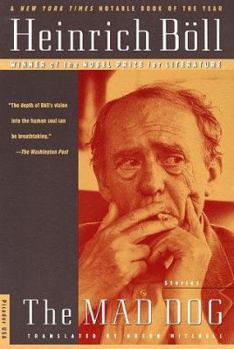The Mad Dog: Stories
Select Format
Select Condition 
Book Overview
A collection of ten previously unpublished stories written between 1938 and 1945 by the Nobel Prize winner examines the sad effects of war on ordinary people's lives. This description may be from another edition of this product.
Format:Paperback
Language:English
ISBN:0312195494
ISBN13:9780312195496
Release Date:October 1998
Publisher:Picador USA
Length:164 Pages
Weight:0.50 lbs.
Dimensions:0.5" x 5.5" x 8.2"
Customer Reviews
3 ratings
Powerful, crisp and potent explorations on the many dynamics of war.
Published by Thriftbooks.com User , 18 years ago
The ten short stories contained in Heinrich Boll's The Mad Dog offer a sweeping glimpse into the aftereffects of those traumatized by the bloody carnages and mental wounds of war, in this specific case, World War II. Each story evokes an aura of bleakness and despair yet crossed with hope and a trounced upon faith. All the stories are written from a pre or postwar standpont, each exploring the element of postwar poverty, the ruining of human love and the dark side of human nature, which abounds when people are pushed to the limit. Two of the more emotive tales in this collection are "The Fugitive" and "The Tale of Berkovo Bridge". The former tells the story of a runaway soldier, desperate to flee the dark war torn atrocities of his environment, how he takes refuge in a rectory with a priest who just listens before the soldier's inevitable destiny manifests. The latter tale showcases the ingenuity, creativity, helpfulness and determination naturally imbued in man via the construction of the Berkovo Bridge. Though it is a simple story, it is one that shows the best of man. Conversely, the bridge, upon completion, is immediately destroyed by the idiocy of war. Boll's subtle use of symbolism and metaphores in expressly showcasing the black, animalistic impulses inborn in all of us is certainly not lost, for it is tragedy heaped upon tragedy just for the limited clasping of power that was never ours to begin with. All the stories in The Mad Dog are weighty, made so by the gut-wrenching acts that are forced to be performed in the name of survival and politics; they go against the conscienceness of desire. Thus, each story, with its own unique, horrific absurdity, is a caged tragedy for us to learn from.
An Apposite Elegy for the Twentieth Century
Published by Thriftbooks.com User , 23 years ago
Like Graves, Sassoon and Owen in the First World War, Heinrich Böll brought a mix of apathy and disgust to his writings about World War II as well as a literary sensibility that condemned him to this genre. Böll, along with Günter Grass, author of The Tin Drum, and Arno Schmidt, is considered one of the most influential German writers of the postwar period.The Mad Dog represents the third extraction from material left by Böll at his death in 1985 and contains nine previously unpublished stories and a novel fragment, all written between 1936 and 1950. I think they represent the best introduction to Böll available. They also anticipate his best work, the novels, Billiards at Half-Past Nine and The Clown. The Mad Dog will probably have the most appeal to readers who are already familiar with these great novels and who want to listen to the source of Böll's recurring themes.Youth on Fire represents the earliest work contained in this book and is a poignantly clumsy parable of Heinrich, a sixteen year old boy of Wetherian turn of mind. When Heinrich meets a woman, however, his life takes a very different course. In a demi-parable uttered by one of the characters there is a flash of the mature Böll's bitter humor.The Fugitive and Trapped in Paris, composed ten years later, are the antithesis of Youth on Fire. These two stories are of a desperate and solitary soldier, in the former, an escaped POW or a deserter and in the latter a German soldier cut off from his unit during secret battles. In these stories, the iconic and discursive idealism of Youth on Fire is replaced by the naturalistic German Expressionism that became Böll's signature in the years immediately following the war and which reached its peak in one of his most famous stories, Stranger, Bear Word to the Spartans We.The Fugitive is very close to the model of Böll's postwar work and consists of a dramatic narrative of claustrophobia and fear that concludes abruptly and violently.The Rendezvous contains one of Böll's recurring themes: the difficulty of love. Böll was a writer whose sense of the absurdity of Eros was as highly developed as was his sense of the absurdity of Thanatos. Although many of his stories, such as the beautiful My Pal With the Long Hair, celebrate the triumph of love, most of them seem to center on love's impossibilities instead. Centering on a turbulent and mysterious affair, The Rendezvous contains an implicit riddle, much like Hemingway's Hills Like White Elephants.The Tribe of Esau is an unusual early experiment in the use of a female character's perspective and The Dead No Longer Obey, according to the translator's notes, reworks a passage from the draft of a play entitled As the Law Demanded. This story is yet another soldier parable with a characteristic poetic and rhetorical twist.The Tale of Berkovo Bridge and the novel fragment, Paradise Lost stand out as the work of the mature Böll and neither is really heretofore unpublished material. The forme
great psychological insight
Published by Thriftbooks.com User , 24 years ago
Boell's ability to describe very different character's points of view is excellent. This is a very good book for anyone who is interested in German anti-war literature.





